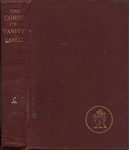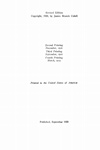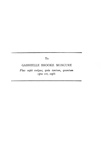James Branch Cabell : An Illustrated Bibliography
THE CORDS OF VANITY: A Comedy of Shirking
Hall Code |
Description |
CoV-C4 (K) |
Fourth Printing, Revised Edition |
COMPILATION
Full Title:
Title page recto: [in decorative script] The | Cords of Vanity | [rule broken by the tail of "of" in the line above] | [in italic] A Comedy of Shirking | [rule] | By | JAMES BRANCH CABELL | With an introduction by Wilson Follett | [in italic] "Woe unto them that draw iniquity with cords | of vanity! . . . . . their root shall be as rottenness | and their blossom shall go up as dust." | NEW YORK | ROBERT M. McBRIDE & CO. | 1924 (see image above).
Title page verso: Revised Edition | Copyright, 1920, by James Branch Cabell. | [in italic] Second Printing | December, 1920 | Third Printing | September, 1921 | Fourth Printing | March, 1924 |
Printed in the United States of America | Published September 1920 (see image above).
Publication:
New York: Robert M. McBridfe & Company, March, 1924.
Collation:
Crown octavo [ 19.7 cm. (7¾ in.) x 13.3 cm (5¼ in.)]; Pp. xvi + 330 + 3 blank leaves; (i) half-title; (ii) BOOKS by MR. CABELL; (iii) title page; (iv) publication data; (v) dedication (verso blank); (vii) fly-title: AN INTRODUCTION (verso blank); ix-xiv text of Introduction; xv CONTENTS (verso blank); (1) fly-title: THE PROLOGUE (verso blank); 3-330 text; 3 blank leaves. Pages (vii) and (1) are fly-titles. Pages (vi), (viii), (xvi), (2), and (12) are blank.
Binding:
Kalki binding: red-brick cloth, gilt lettering and decorations on spine and front cover, top edge trimmed, else untrimmed. Spine: THE | CORDS | OF | VANITY | [rule] | CABELL | McBRIDE; Front cover: Kalki device at lower right (see image above).
Dedication:
[rule] To | GABRIELLE BROOKE MONCURE | [in italic] Plus sapis vulgus, quia tantum, quantum | opus est, sapit. | [rule] (see image above).
Dust jacket:
Not seen.
Notes:
The quotation on the title page is from Isaiah 5:18 of the King James Version of the Bible. The Latin phrase in the dedication translates as “The common people are wise because they know only as much as is necessary.”




